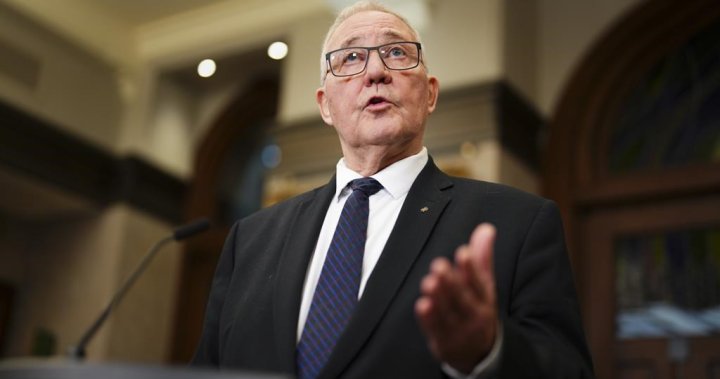Canada’s defence minister says steps taken last week to modernize the military justice system is part of an overhaul of military culture that is crucial to reversing the “death spiral” of shrinking recruitment.
“I very strongly believe cultural change is a process, not an event,” Bill Blair said in an interview on The West Block with Mercedes Stephenson. “And it really requires that we’re going to institutionalize that change.“
Blair believes a crucial first step in fixing the military’s recruiting problem is admitting there is a serious problem. Blair gave a speech in early March to a military conference and, in a room filled with admirals, generals, and other senior leaders of the Canadian Armed Forces, he described the CAF’s inability to attract more members as “a death spiral.”
He told Stephenson he deliberately used that strong language as a “wake-up call” to the leaders in the room.
“I think it’s really important for us to acknowledge that a prolonged period of time where more people are leaving and joining the Canadian Armed Forces isn’t sustainable,” Blair said in The West Block interview.
“That was my intent in speaking to people who I think are very important in Canadian military and military culture.”

Blair made a direct connection between boosting recruiting numbers and overhauling the current culture of the Canadian Armed Forces, a culture where sexual misconduct by senior male leaders was for many years overlooked or trivialized.
Breaking news from Canada and around the world
sent to your email, as it happens.
Breaking news from Canada and around the world
sent to your email, as it happens.
Former Supreme Court of Canada justice Louise Arbour’s scathing report released in 2022 found the top ranks of the Canadian Armed Forces were “incapable” of recognizing the “deficient” parts of a culture that keep sexual misconduct and abuse of power entrenched.
Global News first brought to light allegations in February 2021 of sexual misconduct against senior leaders in the Canadian Forces — the first of dozens of exclusive reports.
To that point, last week, changes to the National Defence Act were tabled in the House of Commons.
Among other things, the new legislation takes investigations and prosecutions of Criminal Code sexual offences away from the military and puts them in the hands of civilian personnel, enshrining a policy that had been issued by Blair’s predecessor, Anita Anand, as a ministerial directive in late 2021.
Blair is a former chief of police in Toronto and, in the 1980s, served as the sexual assault investigation coordinator for Toronto Police Services.
That experience, he said, has helped him now, as minister of national defence, assess the proposed changes to the way the military deals with those cases.
“Change is absolutely necessary,” Blair said. “I also heard very clearly the experience of many victims and their lack of trust in a system that is supposed to protect them and supposed to support them.”
For 2022-2023, the CAF had hoped to have a headcount of 91,884, including 46,143 in what it calls “ready forces,” personnel serving in combat-capable units.
But, according to the CAF’s most recent departmental results report, it fell short on both counts with an overall headcount of 89,864 — the first time in years the CAF population dropped under 90,000 — while “ready forces” number just 43,777.
For the current year, the CAF is hardly bullish about boosting those numbers. It hopes to grow the overall CAF population by just 872 to 90,736 and its “ready forces” by just 169 to 43,946.

In a profile of Canada’s military population published in 2022, Statistics Canada said that about one in five members of the Canadian Armed Forces were women.
And while the CAF has looked at eliminating some eligibility requirements for serving in uniform in order to increase the pool of potential recruits, one of the CAF’s biggest problems is its inability to quickly process new recruits.
“Frankly, we’ve got to go fast,” Blair said. “When maybe 16,000 people come with an application and say they’re interested in a career in the Armed Forces and more than a year later, less than 100 of them have actually processed — that’s not acceptable.”
Blair said he has made the argument at the cabinet table for more spending on defence.
Deputy Prime Minister and Finance Minister Chrystia Freeland will table the 2024-2025 budget on April 16 and analysts have already said there is little room for increased spending anywhere if Freeland wants to hold to previously announced fiscal targets on debt and deficits.
“We’re going into a very robust discussion taking place on how we do what needs to be done,” Blair said. “There’s a lot of other competing challenges that the country faces. But we recognize the importance of of investing in the Canadian Armed Forces and most importantly, investing in the men and women who serve.”
© 2024 Global News, a division of Corus Entertainment Inc.



